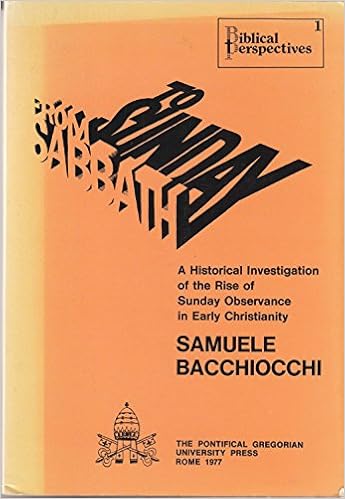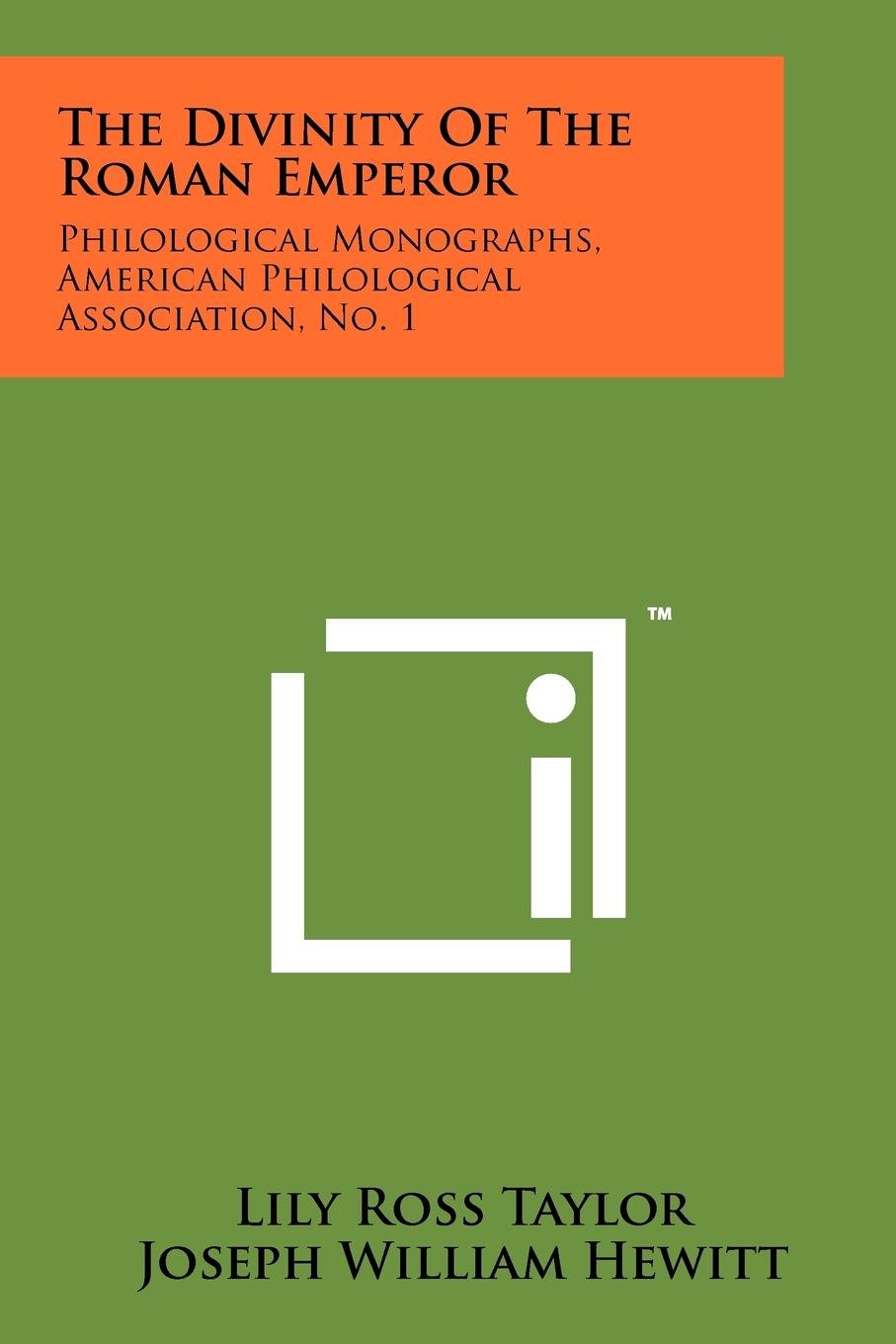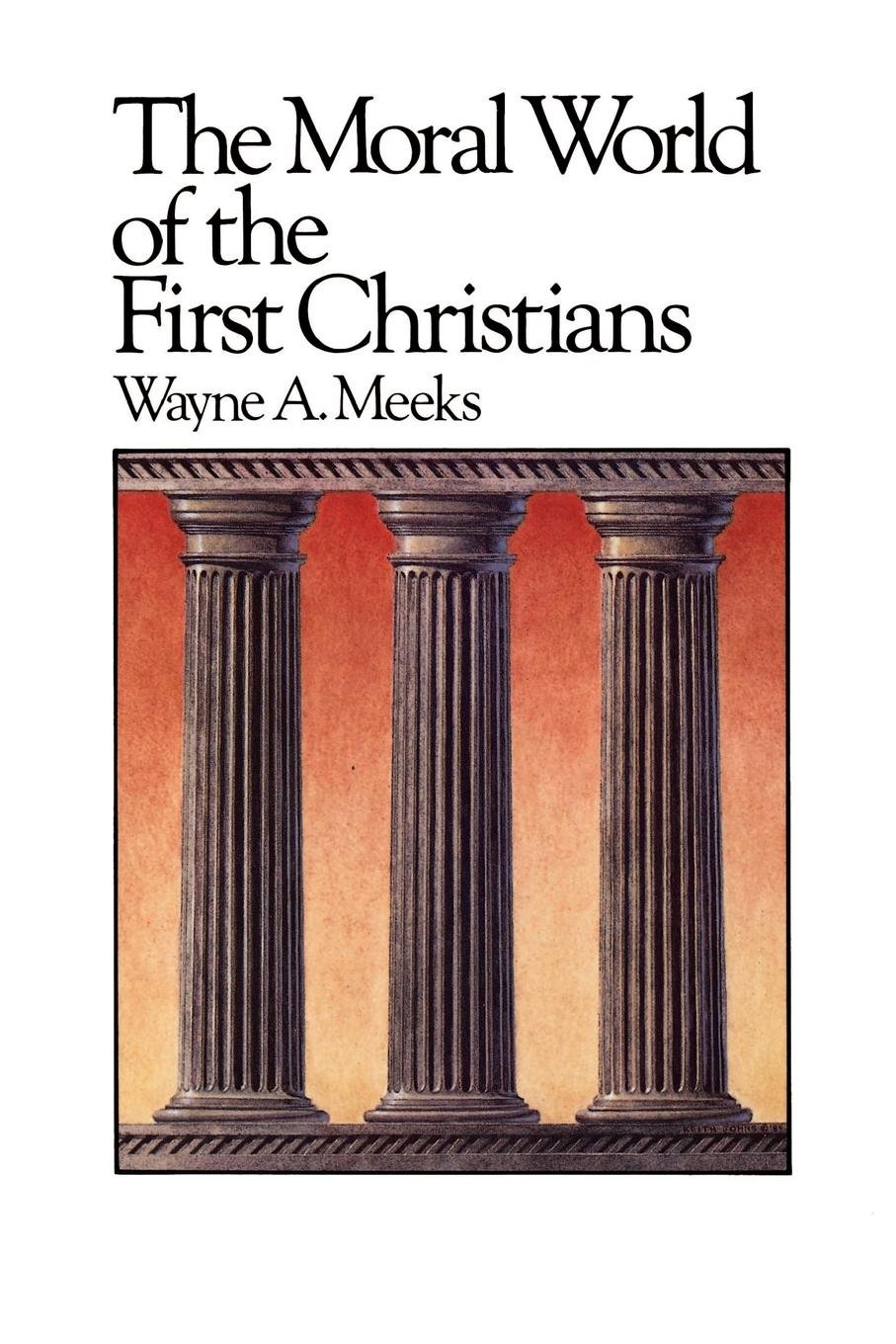Sunday, November 24, 2019
On "Pointing East, Where Things Happen" by Donna Baier Stein (3770 words) ***
Is he or isn't he? When a man has an affair, it's hard to trust him ever again--that's the angle in this story, centered on a revival meeting and a mysterious bracelet too small for his wife. Read the story here at Summerset Review.
On "From Sabbath to Sunday" by Samuele Bacchiocchi *****
This was a reread for me. The last time I read the book was back in 1995, when some doctrinal changes in the church I was attending were going on. Back then, I thought the book useful, but I'm not sure how interesting I found it. It seemed quite scholarly, perhaps even a bit difficult.
Having now worked with scholarly books for more than twenty years and having read more extensively among the works Bacchiocchi examines, this book now seems like a fairly easy read. The more interesting parts for me are those that focus on the historical shift to Sunday and those that discuss specific scriptures used to justify the shift. Much of the early portion of the work focuses more on other scholars' claims regarding the shift, showing how those claims don't pass muster. In that sense, those early sections are where the book seems most scholarly and most tied to the dissertation from which it derives. When Bacchiocchi is dealing with primary sources, as the later chapters do, the work is much more interesting, indeed, for me, gripping.
Having now worked with scholarly books for more than twenty years and having read more extensively among the works Bacchiocchi examines, this book now seems like a fairly easy read. The more interesting parts for me are those that focus on the historical shift to Sunday and those that discuss specific scriptures used to justify the shift. Much of the early portion of the work focuses more on other scholars' claims regarding the shift, showing how those claims don't pass muster. In that sense, those early sections are where the book seems most scholarly and most tied to the dissertation from which it derives. When Bacchiocchi is dealing with primary sources, as the later chapters do, the work is much more interesting, indeed, for me, gripping.
Saturday, November 23, 2019
On "The House of the Dead Hand" by Edith Wharton (10,201 words) *****
Wharton had a knack for mysteries. This one reads like a gothic tale ala Poe and Borges. A man is asked to get a copy of a newly discovered painting by Leonardo, which has been purchased for a private collection. The purchaser, however, is a man who will not allow others to photograph the image and, save for the young visitor (who has some special connections), even look or describe the painting, which was purchased by the daughter of the current owner. The painting, however, is also the daughter's prison sentence, for the father is not just possessive of it but insanely attached to it such that no one else in the family can live a normal life. Read the story here at the Atlantic.
Labels:
10000+ words,
Atlantic,
Edith Wharton,
Five-Star Stories,
Stories
On "The Divinity of the Roman Emperor" by Lily Ross Taylor ****
This book proved to be quite gripping in its middle section wherein Octavian and Alexander were competing for power--and it was really in the midst of that that the move toward making the Roman emperor into a god happened, which emphasizes the extent to which that move was largely for political ends.
As Taylor notes, the real irony is that while Caesar was killed to keep him from amassing too much power and becoming a "god," his very death is what led to him gaining divinity and thus the emperors that would follow him.
The idea that an emperor would be a god was really something that derived from eastern kingdoms in the Roman empire--most specifically Egypt. People in that portion of the empire were thus more inclined to think of an emperor as a god to begin with. The trickier part was getting Roman people to go along with such an idea. In that sense, a dead emperor was more easily proclaimed such than a living one. Rather, it was the "Genius" (similar to a metaphysical soul) of an emperor that was godlike and that was worshiped. This Genius, within the emperor, lived on beyond his body, ascending to the godly realm after the body's death.
That nations like Judah were allowed not to worship an emperor, while still showing deference to him through sacrifices for him rather than to him, shows also the degree to which emperor worship was largely for political ends--whatever works to subject people to the rulership is what was most important.
As Taylor notes, the real irony is that while Caesar was killed to keep him from amassing too much power and becoming a "god," his very death is what led to him gaining divinity and thus the emperors that would follow him.
The idea that an emperor would be a god was really something that derived from eastern kingdoms in the Roman empire--most specifically Egypt. People in that portion of the empire were thus more inclined to think of an emperor as a god to begin with. The trickier part was getting Roman people to go along with such an idea. In that sense, a dead emperor was more easily proclaimed such than a living one. Rather, it was the "Genius" (similar to a metaphysical soul) of an emperor that was godlike and that was worshiped. This Genius, within the emperor, lived on beyond his body, ascending to the godly realm after the body's death.
That nations like Judah were allowed not to worship an emperor, while still showing deference to him through sacrifices for him rather than to him, shows also the degree to which emperor worship was largely for political ends--whatever works to subject people to the rulership is what was most important.
Sunday, November 10, 2019
On "Deafness" by James Chapin (2276 words) ****
This lightly science fiction story revolves around a mysterious phenomenon wherein vast swaths of people lose their hearing. It's told in the form of a letter from one relative to another, about the "old days"--the days when one could hear. The other day I was on the phone with my mother; dad couldn't come to the phone. His hearing's not so good these days, and on this day, it was no good at all. What is there to say to a silent world? What is there to say to the silence? Chapin has some ideas. Read the story here at New World Writing.
Labels:
2000+ words,
Four-Star Stories,
James Chapin,
New World Writing,
Stories
On "The Moral World of the First Christians" by Wayne A. Meeks ****
This text is a basic introduction to the ways in which people in the first-century Roman empire discussed and determined what moral action is. Meeks devotes individual chapters to Greco-Roman philosophical thinking, Jewish thinking, and Christian thinking on the subject.
Because these are such large subjects, he chooses to focus on various philosophical schools and within those various philosophical schools individual philosophers. As such, Plutarch's writing stands in for Platonic philosophy; Musonius Rufus for the Stoics. In the end, he looks for what they have in common: the desire to lead a happy life is the choice to live in conformity to nature, which is made possible by reason.
For Jewish moral thinking, Meeks focuses on sages, like Yeshua ben Sira, the sect at Qumran, Philo, and the Mishnah. All, of course, stress the importance of the biblical law, though they differ to a great degree in terms of how much they integrated those ideas into Greek thinking.
Meeks then looks at various types of (or emphases among) Christian sects (Gentile, Jewish, Apocalyptic) and closes with a discussion of where such sects met: synagogue, house, school, and church.
Finally, in the last chapter, Meeks examines what specific New Testament passages tell us about the moral foundation of Christians in the first century, how the writings were related to common literary practice, and how the moral standards developed into standardized forms of expression.
Because these are such large subjects, he chooses to focus on various philosophical schools and within those various philosophical schools individual philosophers. As such, Plutarch's writing stands in for Platonic philosophy; Musonius Rufus for the Stoics. In the end, he looks for what they have in common: the desire to lead a happy life is the choice to live in conformity to nature, which is made possible by reason.
For Jewish moral thinking, Meeks focuses on sages, like Yeshua ben Sira, the sect at Qumran, Philo, and the Mishnah. All, of course, stress the importance of the biblical law, though they differ to a great degree in terms of how much they integrated those ideas into Greek thinking.
Meeks then looks at various types of (or emphases among) Christian sects (Gentile, Jewish, Apocalyptic) and closes with a discussion of where such sects met: synagogue, house, school, and church.
Finally, in the last chapter, Meeks examines what specific New Testament passages tell us about the moral foundation of Christians in the first century, how the writings were related to common literary practice, and how the moral standards developed into standardized forms of expression.
Subscribe to:
Posts (Atom)








